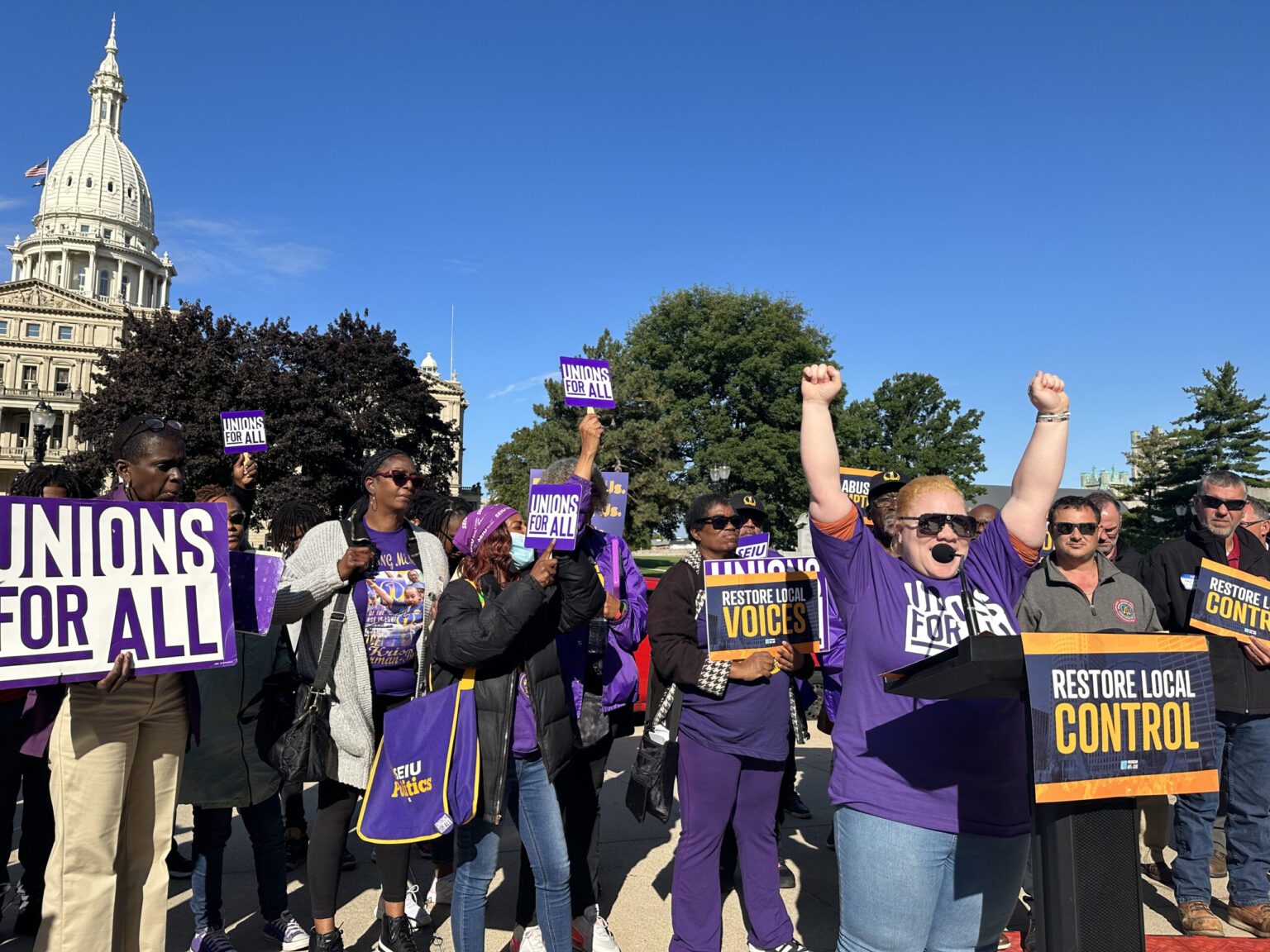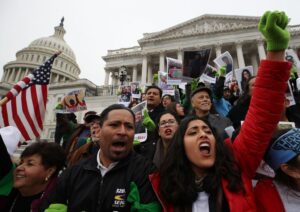9:00
News Story

Porchá Perry demonstrates with other workers in Lansing, Michigan, in favor of bills restoring local control to pass workforce and labor policies on Sept.13, 2023. A new report finds growing union organizing across the country has triggered an anti-labor legislative response in some states, but cities and counties are increasingly pushing back (Photo courtesy of SEIU Local 1).
Growing union organizing across the country has triggered an anti-labor legislative response in some states, but cities and counties are increasingly pushing back, a new report found.
The report, released this month by the New York University Wagner Labor Initiative and Local Progress Impact Lab, a group for local elected officials focused on economic and racial justice issues, cites examples of localities all over the U.S. using commissions to document working conditions, creating roles for protecting workers in the heat and educating workers on their labor rights.
In the face of increased worker organizing and Americans’ higher approval of labor unions in the past few year (hitting levels not seen since the 1960s), many states have introduced bills aimed at stopping payroll deduction for union dues and punishing employers that voluntarily recognize a union through the card check process. In April, several governors in Southern states, including Tennessee, Alabama, Georgia, and Mississippi, advocated against auto workers voting for a union.
“We know that there has been an increase in worker organizing and definitely an increase in high-profile worker organizing and certainly that action has had a reaction,” said Terri Gerstein, director of the NYU Wagner Labor Initiative and co-author of the report.
However, state preemption laws, which can make local ordinances void and could prevent many localities from implementing more worker-friendly policies, are also on the rise. There was a surge in preemption laws from 2015 to 2017 on everything from the minimum wage to paid leave, according to a June 2024 analysis from the Economic Policy Institute, a left-of-center think tank.
Although the passage of preemption legislation has slowed, according to the EPI analysis, the effects on localities are still damaging to workers’ rights, authors of the report explain. But labor and policy experts say there are still opportunities for localities to push back against efforts to limit labor organizing and gut the enforcement of labor protections.
“Localities are doing more to fight for working people and advance workers’ rights, and I think in states where there is rampant state hostility and abusive state preemption, local governments are also the leaders of trying to advance workers rights in those states and address new challenges and threats like heat, for example,” said the report’s other co-author, LiJia Gong, the policy and legal director at Local Progress.
Some business organizations, such as the National Federation of Independent Business, say preemption laws help small businesses, which don’t have the capacity “to navigate duplicative, overlapping and potentially contradictory local labor laws.”
“NFIB has supported legislation that creates statewide, uniform standards for minimum wage rates and legislation that establishes a preemption of paid sick leave proposals by local governments,” the group said in a prepared statement.
Gerstein and Gong argue that these efforts are not always concerned with uniformity, such as taking away a locality’s ability to raise the minimum wage when the state does not set a higher minimum wage itself.
In states where there isn’t state-level wage enforcement, localities can pass ordinances that allow workers to file complaints and get stolen wages back without a lawyer, as some Florida localities have done.
There are also things cities and counties can do to prevent heat-related injuries and illnesses, including in the workplace. Miami-Dade County, Phoenix, and Los Angeles have chief heat officers whose role it is to protect people from the effects of extreme heat.
“Unlike a lot of other hazards, people don’t really understand how dangerous workplace heat is and that there are workplace fatalities. But research also shows that there are high rates of worker injuries and accidents of various kinds on hotter days,” Gerstein said.
Amid state efforts to weaken child labor laws, schools are also some of the best tools localities have to ensure kids aren’t working in dangerous conditions, the authors said. School boards could use their power to include workers’ rights education in the curricula, for example.
“School districts can do a lot to educate families on child labor laws and age-appropriate employment opportunities, and they can also play an important role in identifying students who might be working in prohibited occupations and refer those cases to state and federal labor enforcers,” Gong said.
Worker boards can also document and seek to improve working conditions on the local level. The boards, created by local governments, have worker representation and can conduct worker outreach and make policy recommendations on wages and benefits. Last year, the Detroit City Council voted to create an industry standards board for workers at pro sports facilities including Ford Field, Little Caesars Arena, and Comerica Park.
Board member Porchá Perry, a mother of two children who works at Comerica Park and Ford Field, said her role is reaching out to workers to share their experience of working conditions. Workers say they are concerned about low wages, child care, transportation and safety. Perry said that although she is personally less concerned about finding child care, she wouldn’t have to work multiple jobs if wages were higher and she would be able to see her kids more.
“It’s hard to have quality time,” she said.
The board also has spots for city council members and the mayor’s office.
“It’s a voice for everybody – government officials, employees, the management department. It’s somewhere for everybody to sit at the table and speak,” she said.
Britain Forsyth, legislative coordinator for Step Up Louisiana, a group that organizes for economic and education justice, said New Orleans has focused on becoming a model employer. New Orleans increased the minimum wage to $13.25 for city employees, which became effective in 2022, and rose to $15 in 2023. In 2023, the New Orleans City Council codified city employees’ right to organize. Louisiana does not have a state minimum wage law, so the city’s minimum wage is far above $7.25, the federal minimum wage.
Step Up Louisiana is also working to pass a workers’ bill of rights on the November ballot in New Orleans. It would add to the bill of rights in the city’s home rule charter that workers deserve a living wage, paid leave, safe workplaces and health care coverage and says that all laws and regulations regarding unions should be respected.
“We call the question to the city about what we believe in, and we make it clear to employers here and folks who want to open businesses here that this is how we think workers should be treated,” he said.
Authors of the report also suggest that more localities should take on wage theft, since state and federal authorities frequently struggle to enforce wage judgments and recover wages.
These agencies are often under-resourced, have frequent staff turnover and manage complex cases, Gerstein said. Local labor agencies could provide help conducting interviews or prepare cases for state or federal agencies to follow up on. San Diego County has a fund for staff to pursue employers for wages and provides $3,000 to people who are victims of wage theft and have final unpaid wage orders from the state.
Gerstein said she’s seeing cutting-edge approaches to enforcing worker protections in places like Seattle, Boston, New York City and Denver, where the state is friendlier to workers. For example, in Sept 2022, Boston Mayor Michelle Wu created the Worker Empowerment Cabinet, including the Office of Labor Compliance and Worker Protections.
Jodi Sugerman-Brozan, Boston’s deputy chief of worker empowerment and the director of the office of labor compliance and worker protections, said her office has done educational outreach, including free OSHA training sessions for over 1,200 people and a set of trainings for how to create a heat illness prevention plan. Last year, Wu signed an ordinance that requires certain safety standards and training for city construction projects.
“Cities and countries don’t have a lot of power but they can use the power of contracting and vending to drive labor standards,” Sugerman-Brozan said.
But Gerstein added that local governments in more employer-friendly states are also stepping up to advocate for workers.
“It’s a very different landscape where the local government may be the only place where the government is standing up for workers,” she said. “There is largely stagnation in Congress because of the filibuster and other reasons, an unfriendly state government, and your state department of labor isn’t particularly worker protective and is more focused on being employer and business-friendly. State AG offices aren’t really doing anything.”
Even a small local office can make a difference, Gerstein said.
“Hire dedicated staff to be the worker rights person. Create an office and an army of one. That’s how these things can start.”
Our stories may be republished online or in print under Creative Commons license CC BY-NC-ND 4.0. We ask that you edit only for style or to shorten, provide proper attribution and link to our website. AP and Getty images may not be republished. Please see our republishing guidelines for use of any other photos and graphics.




